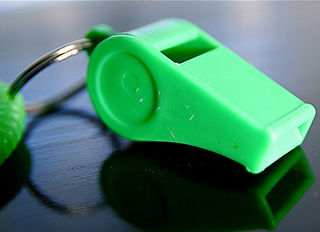Trust
Whistleblowing, Civil Disobedience, and Democracy
Was it okay to blow the whistle on Flynn? This blog looks at three key concepts
Posted February 19, 2017

Recently, National Security Advisor Michael Flynn was fired by the Trump administration after government officials leaked classified information to the press about phone communications between Flynn and Russian Ambassador Sergey I. Kyslyak, occurring prior to Trump’s inauguration, involving (in part) the easing of sanctions on the Russians imposed by the Obama administration for their invasion of the Ukraine. In response, an outraged Trump administration focused its attention on finding and punishing the leakers for leaking classified government information to the press, but not on Flynn’s potentially illegal act of undermining existing government policy while still a civilian.
In the aftermath of the leak, the press has hotly debated the issue of what is more important, stopping leakers or investigating actions such as Flynn’s. The term “whistleblowing” has had a prominent place in these debates, with some parties to the debate using it to praise the leakers for their public service, while others decrying the leakers as “criminals.”
In this emotionally charged context with potentially far-reaching consequences for national security, it could prove helpful to seek a clearer understanding of the concepts involved, and their relationship to a democratic process. Indeed, the question of whether the actions of the leakers were justified is an ethical question, grist for the mill of analysis by moral philosophers.
In fact, the activity of whistleblowing has received considerable attention in the last three decades by philosophers working in the areas of business and professional ethics. In my capacity as the editor and founder of the International Journal of Applied Philosophy, the world’s first comprehensive journal dedicated to the field, I have had an opportunity to help develop some of this literature, and have worked closely with some of the prolific writers in this area such as the late Frederick A. Elliston. So I feel a special obligation to weigh in on this matter. This blog entry is accordingly my contribution to the debate.
“Blowing the whistle,” as generally understood in the philosophical literature, involves disclosure by employees of businesses, public and private institutions, or government agencies, of illegal, immoral, or questionable practices occurring within those organizations. The motive of disclosure, even if this is to harm the perpetrator of the unacceptable practice, is irrelevant to whether an act qualifies as an act of whistleblowing. Thus, a person can blow the whistle for purely self-interested purposes, such as getting back at someone. As such, the question about the moral character of the individual making the disclosure is one matter; whether or not the individual engaged in whistle blowing, and whether or not the act is justified are logically distinct questions.
Therefore, the merit of the act of whistle blowing, as distinct from the motive of the whistleblower, needs to be assessed according to whether the weight of the wrong-doing is sufficient to justify the disclosure. So there can be very poor (morally unjustified) decisions to blow the whistle by very well intentioned whistleblowers, as when the matter could be more easily settled within the organization; but there also can be some very well founded ones, regardless of the motive, as when the danger is so serious that it needs to be brought to public light, and whistleblowing is likely to be the only way of accomplishing this goal.
One practical upshot is that media arguments which revolve around whether the leakers in the Trump administration had nefarious motives to undermine the Trump administration are patently irrelevant to the merit of the act of whistleblowing. Indeed, the Whistleblower Protection Enhancement Act of 2012 makes this clear in its provision that, “a disclosure shall not be excluded from [protection] because....of the employee’s or applicant’s motive for making the disclosure.”
With respect to the legality of disclosures, the Whistleblowers Protection Act protects disclosures by federal employees, or former employees, which the employees believe evidence "(A) a violation of any law, rule, or regulation; or `(B) gross mismanagement, a gross waste of funds, an abuse of authority, or a substantial and specific danger to public health or safety." So, the whistleblower must have reasonable belief that a violation exists; but, the motive for disclosing what the employee reasonably believes to be a violation is irrelevant. So, was the disclosure made by government officials regarding Flynn's questionable communications legally protected?
The answer is no. The Act also requires that the information disclosed is "not specifically prohibited by law." Since the information in question was classified, it was not protected by this Act. However, the illegality of the disclosure does not mean that it was unethical to disclose it. It instead means that the individuals who disclosed it were not immune from being prosecuted for the disclosure.
In this manner, the whistleblowing in question resembles significantly an act of civil disobedience. The latter involves a citizen’s refusal to comply with a certain law that is arguably immoral or unjust. Civil disobedience is an important way in which necessary legal change can be affected. Indeed, in our democracy, if nobody ever challenged unjust laws, they would not likely be changed. Rosa Parks refused to give up her seat on a bus to a white man in defiance of an Alabama state segregation law, and the rest is history. The law was iniquitous and needed to be challenged, and Rosa Parks (along with others) met that challenge and helped to change a law that needed to be changed.
In the case of whistleblowing, a private citizen can likewise help to affect necessary social change. Merrill Williams, a paralegal who took on the tobacco industry, violated a confidentiality agreement for the law firm he worked for in order to disclose that the Brown & Williamson Tobacco Corporation was, for decades, intentionally hiding evidence that cigarettes were carcinogenic and addictive. On a federal level, in the famous Watergate scandal, Associate Director of the Federal Bureau of Investigation (FBI) Mark Felt (AKA “Deep Throat”) blew the whistle on the illegal activities of the Nixon administration, which led to the resignation of President Nixon as well as incarceration of White House Chief of Staff H. R. Haldeman and United States Attorney General John N. Mitchell, among others. Clearly, there are unequivocal historical precedents demonstrating that acts of whistleblowing can make profoundly important contributions to setting legal as well as moral limits on the abuse of power in protecting public welfare.
Both whistleblowing and civil disobedience also involve taking calculated personal risks in challenging illegal or immoral practices, including loss of one’s job, harassment, death threats, physical injury, fines, and imprisonment. Inasmuch as the moral and/or legal gains are substantial, and the whistleblower seeks these changes for their own sake (not for self-serving reasons), individuals who engage in whistleblowing or civil disobedience exercise moral courage. This is noteworthy because critics of whistleblowers and of the civilly disobedient sometimes uncritically charge that such individuals are necessarily “traitors,” “criminals,” or otherwise unethical or bad people. To the contrary, they may be among the most courageous, heroic, or patriotic people. Just consider Rosa Parks! She broke an Alabama state law, yet we would be hard put to call her a “criminal.” On the other hand, there is loyalty among thieves, but that does not make them ethical.
In a democracy, whistleblowing, as well as civil disobedience, serve a valuable function. Like the press, whistleblowers can help to expose flagrant violations of public trust by government trustees, often working cooperatively with the press, as in the Flynn case. This may be why corrupt political leaders who hate the press also tend to despise whistleblowers. Insofar as whistleblowers, like the press, seek transparency, they tend to be perceived as "the enemy."
Leaks of classified government information by a whistleblower, while illegal, can serve a valuable social purpose if it exposes a serious national danger. In leaking classified information, as in the case of information about the communications of Michael Flynn with the Russian Ambassador, the leak may be of monumental importance to national security. If there is an attempt to undermine national security by a foreign enemy, and those whom the people trust to protect them are colluding with this enemy, then such information arguably should be disclosed to the public as long as there is no reasonable alternative to prevent the potential harm. As in civil disobedience, we would expect that the leakers who are caught will be prosecuted. However, as members of a democratic society, we should also trust that the information that is leaked will be taken seriously and that any national security breaches that are exposed be fully investigated. This is how democracy works.
So was it morally justified for the government officials to leak the information about Flynn’s conversations? Flynn, it is claimed, lied to the Vice-President about the content of his conversations, denying that they involved discussions about sanctions on Russia. However, this matter could easily have been put to rest if the government officials disclosed this information to the V.P. or to their superiors, who could, in turn, inform the V.P. In fact, this actually happened when Acting Attorney General Sally Yates notified the White House of the intercepted communications. However, the potential harm was not merely that of lying to the V.P.; it was also about a potential breach of national security. Was this urgent matter likely to be handled effectively by the Trump administration without leaking the information to the press?
As it happened, the White House did not fire Flynn until after the information was leaked, even though it had received the information from the Acting Attorney General a few weeks prior. So, it is possible that the leakers did not perceive any other way of effectively addressing the perceived violation other than by blowing the whistle on Flynn. Doing so may have already succeeded in helping to remove a "weak link" in the chain of command. However, it remains to be seen what comes next.




